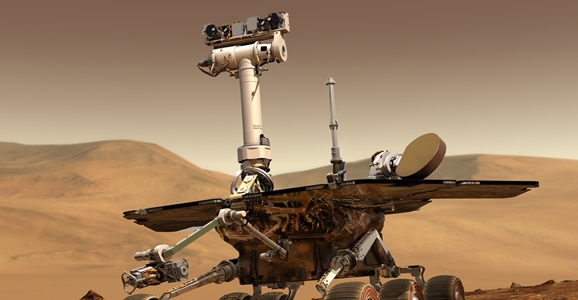Expert Says NASA Won’t Be Able To Boldly Go To Mars On Its Current Budget
This article is more than 2 years old
 NASA’s budgetary woes, made even worse by the sequester, could dash dreams of putting a human on Mars.
NASA’s budgetary woes, made even worse by the sequester, could dash dreams of putting a human on Mars.
On Wednesday, the House of Representatives conducted a hearing to discuss the proposed NASA Authorization Act of 2013. The Act involves appropriations for fiscal years 2014 and 2015, discussions of space exploration policies and operations, as well as goals for developing space sciences, technology, and education. The Act appropriates over $4 billion for space exploration and just under $4 billion for space operations, including International Space Station programs.
While this may sound like a big chunk of change, it’s really a drop in the bucket when it comes to what’s necessary for what many argue should be NASA’s primary goal: getting us to Mars. Among those making that argument is Dr. Steven Squyres, Professor of Astronomy at Cornell University and Principle Investigator of the Mars Exploration Rover mission. Speaking before the hearing on Wednesday, Squyres said, “If by exploring Mars we could show that life emerged there — and therefore that it emerged twice in just this one solar system — it would take no great leap of faith, logic, or anything else to conclude that life may be commonplace throughout the cosmos.” He also emphasized the importance of sending humans, rather than robots, to do this work.

The problem is that “NASA is being asked to do too much with too little. Unless program content can be matched to budget, the result will be wasted effort and delay,” Squyres testified. While Squyres supports the Act’s proposition to develop “a Mars Human Exploration Roadmap defining the capabilities and technologies necessary to extend human presence to the surface of Mars,” he’s skeptical of Congress proscribing any roadmaps or milestones in this exploration, largely due to budgetary concerns.
In 2009, a panel chaired by former Lockheed Martin chief executive Norman Augustine said that the current budget (which has decreased since then), couldn’t sustain a human spaceflight program. In fact, the panel suggested that with such a budget, the U.S. should “scale back its space ambitions,” and Mr. Augustine later added that, because of the budget, “I still think there is no really meaningful space exploration program that involves humans.” On Wednesday, A. Thomas Young, former Executive President of Lockheed Martin, reiterated that belief: “Today, there is a human spaceflight program but no credible human space exploration strategy. There is much discussion about going to the moon, an asteroid, Phobos, Deimos and Mars; however, there is no credible plan or budget.”
Even though this draft bill proposes a budget of nearly $17 billion for the next two years, it’s still less than .50% of the annual federal budget (for reference, roughly 23% of the 2012 federal budget was allocated to defense). Even though times are tough, it’s worth considering whether that slim cut reflects the touted importance of space exploration, specifically putting humans on Mars. Especially if all that money we’re spending on war makes it necessary to find another home.
In 1962, JFK called the moon mission “the greatest adventure on which man has ever embarked.” I think he would agree that now, just over 50 years later, that same sentiment is true for Mars. Hopefully, the fiscal realities won’t kill this dream before it gets off the ground.












